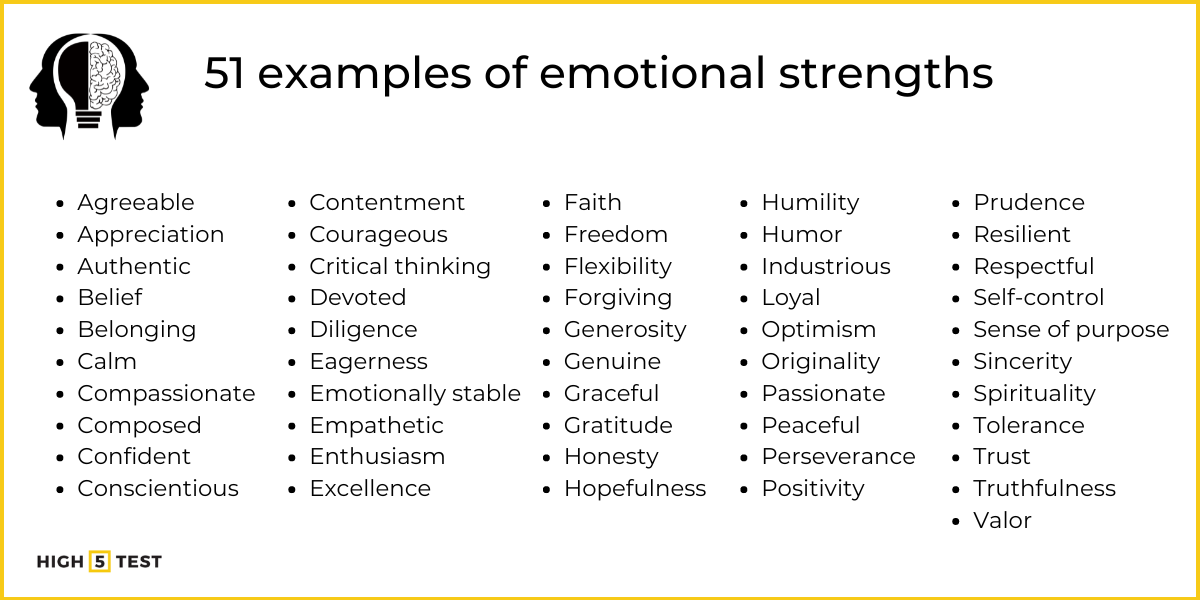When it comes to dealing with challenges life throws at us, some of us may crumble under pressure, while some can pick themselves up quickly and even grow as a result of hard times. A person who is resilient enough to keep moving forward in spite of disappointment, grief, or heartbreak is said to have emotional strength. Emotional strength is the ability to manage and navigate one’s emotions effectively, especially in challenging or stressful situations. Emotional strength contributes to mental well-being and personal development. Emotional strength is considered an important soft skill.
Soft skills are those essential interpersonal characteristics that set you up for success in life, especially in how you relate and work with other people. When we find strategies to increase our emotional strength, we teach ourselves to become valuable team players in our careers, families, and social lives. We should concentrate on improving our emotional strength in the same way that we focus on keeping our bodies in shape or adopting good habits.
In this article, you’ll not only learn about the key characteristics and benefits of emotional strength but also gain a deeper understanding of how to cultivate it in your personal and professional life. We’ll explore the role of emotional strength in relationships and provide examples across all generations. Additionally, we’ll introduce the HIGH5 strengths assessment as a powerful tool to identify and leverage your unique emotional strengths, empowering you to thrive in the face of adversity. By the end, you’ll have a comprehensive grasp of practical strategies to embrace and maximize emotional strength.
What is emotional strength?
Emotional strength is an individual’s ability to feel and be open to intense emotional experiences. It is about how a person deals with obstacles and recovers from them rather than how they react in any given situation. Emotional strength is not about turning a negative into a pleasurable experience. It is where you can feel all emotional experiences at a deeper level, allowing you to be vulnerable and responsive to your emotions. Emotional strength also gives you the skill to change how you perceive and express emotion in your daily life, giving you a better sense of self-control and self-awareness.
51 examples of emotional strengths
| Agreeable | Appreciation | Authentic |
| Belief | Belonging | Calm |
| Compassionate | Composed | Confident |
| Conscientious | Contentment | Courageous |
| Critical thinking | Devoted | Diligence |
| Eagerness | Emotionally Stable | Empathetic |
| Enthusiasm | Excellence | Faith |
| Freedom | Flexibility | Forgiving |
| Generosity | Genuine | Graceful |
| Gratitude | Honesty | Hopefulness |
| Humility | Humor | Industrious |
| Loyal | Optimism | Originality |
| Passionate | Peaceful | Perseverance |
| Positivity | Prudence | Resilient |
| Respectful | Self-control | Sense of purpose |
| Sincerity | Spirituality | Tolerance |
| Trust | Truthfulness | Valor |

Characteristics of emotionally strong people
- They prefer peace over aggression.
- They adopt a growth mindset and are unafraid of making mistakes.
- They focus on how to get around obstacles rather than the obstacles themselves.
- They are vulnerable.
- They embrace change.
- They practice self-care.
They prefer peace more than aggression
Emotionally strong individuals do not exhibit characteristics of dominance and aggression. They understand that true power comes from being in charge of themselves, not others. Peace is the most unbreakable strength we can have. Truly confident people don’t need to prove their “power” over others by engaging in argument for the sake of argument. Rather, they listen to other points of view and make decisions based on their own sense of security.
They adopt a growth mindset and are unafraid of making mistakes
A growth mindset is the belief that abilities and intelligence can be developed through effort, learning, and perseverance. Individuals with a growth mindset are tenacious and thrive in the face of adversity. These people love exploring and trying new things because they know that mistakes aren’t disasters but opportunities. While emotionally strong individuals embrace a growth mindset, identifying and capitalizing on their unique strengths can be a powerful catalyst for even more personal growth and development. By taking the HIGH5 strengths assessment, you can gain valuable insights into your inherent talents and aptitudes, empowering you to explore new avenues for self-improvement. With a clear understanding of your strengths, you’ll be better equipped with emotional strength to navigate challenges, seize opportunities, and continually strive for personal excellence.
They focus on how to get around obstacles rather than the obstacles themselves
Emotionally strong individuals concentrate their efforts on the bigger picture when facing obstacles. They don’t allow themselves to get caught up in temporary setbacks but think ahead to positive outcomes. Emotionally strong people also do not dwell on what they’ve lost. Instead, they focus on what can be gained from each experience.
They are vulnerable
In our society, being vulnerable is considered a weakness. It is difficult and terrifying to express oneself honestly to others. However, vulnerability is an indication of being emotionally strong, because people with emotional strength know that someone else’s opinion of their vulnerability does not have the power to stop them. Vulnerability allows you to be open and honest with yourself and others about your feelings and emotions. When you open yourself to others, you can form a deeper connection with them.
They embrace change
Emotionally strong individuals aren’t afraid of change, because they take appropriate responsibility for the things that are in their control, and they let go of the things they can’t control. When things don’t go to their plans, they take that experience as feedback and do not assign blame for whatever happens. They also avoid ruminating over things they cannot change, including their past mistakes.
They practice self-care
Emotionally strong individuals know that if they don’t take care of themselves, they cannot deal with problems when they arise. They are aware and understand what they need to be at their best. They consume nutritious foods, get enough sleep, and know how to cope with stress in productive ways. They can also recognize and communicate their emotional and physical needs to others.
Pro Tip From HIGH5
Reflect on the specific strengths identified by the HIGH5 assessment and consider how you can leverage them to cultivate a growth mindset. For example, if curiosity is one of your top strengths, actively seek out new experiences, ask questions, and explore unfamiliar domains to fuel your personal and professional development.
Become emotionally strong in 7 steps
Emotional strength is like building your physical strength. It requires you to follow techniques and steps consistently to build your endurance, vulnerability, and resilience. Here is a list of actions that you can consider adopting in your life starting now.
Step 1: Recognize and acknowledge where you are right now
We all go through transitions in our lives. It can sometimes be challenging to understand what is going on while we are experiencing one. You could be dissatisfied with your job or experience a break-up, which is an unpleasant emotional experience. In order to develop your emotional strength, you must take stock of what is going on in your life right now and what makes it difficult for you to feel secure about your emotional life.
Step 2: Take a break
Perhaps, you can go on a trip or book a stay at a place you have always wanted to visit. Take this time to relax and let things settle. In fact, individuals who don’t go on vacations are more likely to suffer serious health effects [1]. Avoid this danger by scheduling rest time in your calendar.
Step 3: Practice gratitude and keep yourself calm
Besides providing a host of health benefits [2], gratitude practice builds your mental and spiritual muscles for finding the positive in your day-to-day life. Gratitude lists are not a method of avoiding the negative. Rather, gratitude is a lens that allows us to be aware and focus on the positive things in life so that we remember the power of our emotional strength to get us through the bad days into the good days. Along with practicing gratitude, you can recharge yourself by taking a moment to meditate, journal, or do any activities that will make you feel energized and calm.
Step 4: Spend time with your loved ones
Reaching out to those close to you is a crucial step in building emotional strength because it teaches you to accept support, fosters deeper connections, and helps you process emotions in a safe and nurturing environment. If you’re not yet comfortable sharing your feelings outright, consider a casual hangout or a meal together to stay connected. Surrounding yourself with loved ones creates a sense of belonging and safety, which helps you recharge emotionally. By engaging with people who care about you, you’re actively developing emotional resilience, learning to lean on your support system, and building the strength to face challenges head-on.
Step 5: Attempt something new to get out of your comfort zone
Challenging yourself to attempt something new is a powerful way to build emotional strength. When you step outside your comfort zone, you face uncertainty and discomfort – experiences that require mental resilience and adaptability. By taking on new activities, you learn to manage fear, overcome self-doubt, and handle setbacks with greater confidence. Each new experience pushes your boundaries, helping you develop emotional flexibility, problem-solving skills, and the courage to face unfamiliar situations, all of which are key components of emotional strength.
Step 6: Make a list of your concerns
Writing down your worries is a valuable technique for developing emotional strength, as it helps bring clarity and structure to overwhelming thoughts. By putting your concerns on paper, you gain a clearer understanding of what you’re facing and can better prioritize them. Take your time with this process – schedule it in your calendar so you can work through your list gradually rather than rushing. As you begin facing each of these items, you’ll not only feel a sense of accomplishment but also strengthen your ability to manage stress and tackle challenges systematically.
Step 7: Identify your strengths and resources
Rather than just focusing on challenges, take time to recognize what’s working well in your life and identify your personal strengths. Make a list of your skills, accomplishments, and resources – things that empower you. Then, reflect on how these assets can help you navigate the concerns you’ve listed earlier. By aligning your strengths with your challenges, you not only boost your confidence but also develop emotional resilience, reminding yourself that you have the tools to overcome difficulties and take control of your situation.
Why is emotional strength important?
You can either let failure break your spirit or let it inspire you to give your best shot the next time. It all depends on how you use your emotions. Your emotional capabilities, shaped by your inherent strengths, profoundly influence how you learn, retain information, and respond to challenges. Investing in building your emotional strength will pay its reward when you meet with failure or rejection. The ability to bounce back after a setback comes from your aptitude and emotional fortitude.
The HIGH5 strengths assessment provides invaluable insights into your unique emotional strengths, equipping you with the self-awareness to harness these powerful assets effectively. By understanding your emotional strengths, you can develop tailored strategies to navigate life’s obstacles with greater resilience and adaptability, ultimately maximizing your potential for personal and professional growth.
Here is a list of benefits of being emotionally strong:
- Increased life satisfaction and overall quality of life
- Improved performance in all areas of life
- More resilience in the face of challenges and difficulties
- Reduced stress and anxiety
- Stronger, deeper relationships with others
- More confidence in problem-solving
- Faster recovery from challenges and setbacks
- Improved critical thinking skills.
Pro Tip From HIGH5
Reflect on the emotional strengths identified by the HIGH5 assessment, such as resilience, empathy, or self-regulation. Develop specific action plans to leverage these strengths in your daily life, whether it’s practicing mindfulness to cultivate emotional awareness or seeking out opportunities to apply your empathy in interpersonal interactions.
Common misconceptions about emotional strength
Emotional strength is often misunderstood, leading to misconceptions that can affect how individuals perceive themselves and others regarding emotional resilience and capability. Understanding these common errors in judgment is crucial for a more accurate appreciation of true emotional strength.
Myth 1: Emotionally strong people do not feel pain
One of the most prevalent myths is that emotionally strong individuals do not feel pain or sorrow. This is far from the truth. Emotionally strong people experience the same emotions as anyone else, including sadness, anger, and disappointment. The difference lies in how they manage these feelings and the speed with which they can recover from difficult emotional states, maintaining function and composure.
Myth 2: Showing vulnerability is a sign of weakness
Contrary to the belief that showing vulnerability is a sign of weakness, true vulnerability is a hallmark of emotional strength [3]. Being open about one’s feelings and admitting when one is struggling demonstrates self-awareness and confidence in one’s ability to handle emotional challenges. This openness can foster deeper connections with others and provide greater support, which is crucial for emotional resilience.
Myth 3: Emotional strength is innate and cannot be developed
Many assume that people are either born emotionally strong or not. However, emotional strength can be cultivated through practice and effort. Techniques such as mindfulness, cognitive behavioral strategies, and emotional intelligence training can significantly enhance one’s capacity for emotional strength.
Myth 4: Emotionally strong people are always calm and controlled
While emotionally strong individuals often exhibit calmness, they also know when and how to express their emotions effectively. Being emotionally strong doesn’t mean suppressing emotions; rather, it involves understanding and expressing them in healthy and constructive ways. The ability to display emotions appropriately across different contexts signifies emotional sophistication and strength, not fragility.
Contrasting emotional strength and emotional fragility
Understanding emotional strength also involves recognizing its contrast with emotional fragility, where individuals may feel overwhelmed by emotional experiences and struggle to recover from setbacks [4]. Emotionally fragile individuals might avoid difficult situations, reflect a lower threshold for emotional discomfort, and exhibit less adaptability to change, unlike their emotionally robust counterparts who face challenges head-on. Emotionally strong individuals use a blend of self-awareness, open expression, and strategic emotional management to navigate the complexities of their feelings and the challenges of life. By clarifying the differences between emotional fragility and emotional strength, we can foster a more realistic and supportive approach to developing emotional resilience in ourselves and encouraging it in others.
Emotional strength in relationships
Quarrels, disagreements, and conflicts are bound to happen in a romantic relationship, but not everyone can manage such difficult trials. They may falter under pressure and not be emotionally strong when it counts most. Cultivating emotional strength in a relationship starts with a deep understanding of your individual and shared strengths. By taking the HIGH5 strengths assessment together, you and your partner can gain invaluable insights into your unique strengths and how they complement each other.
With this knowledge, you can develop tailored strategies that leverage your collective strengths to navigate any obstacle life throws your way. Whether it’s leveraging your partner’s emotional intelligence to foster open communication or drawing upon your shared resilience to weather storms, embracing a strengths-based approach can deepen your emotional connection and fortify your relationship. Some strategies for leveraging emotional strength in a romantic relationship are as follows:
1. Answer self-reflection questions.
What brings you joy? What causes you to be depressed or frustrated in a relationship? In what circumstances do you often feel disappointed?
Knowing your own and each other’s answers to these basic yet crucial questions is the first step toward understanding your shared emotional strength. The answers to these questions allow you to know yourself more deeply and recognize the triggers for your emotional states. It can also prepare you for the uncertainties and surprises that come from your partner.
2. Be flexible and adaptable.
It makes no difference if you aren’t mature enough to be an ideal partner in a relationship. What matters is that you’ve gained exceptional flexibility in dealing with the various situations that may arise in a relationship. You and your partner may be passionate during your honeymoon phase, but the sustainable way to keep a relationship alive starts from within. Learn to adapt, compromise, and be emotionally prepared to support and deal with anything that comes your way.
3. Focus on the positive and things that bring joy.
In any relationship, it’s important to embrace both the positive and challenging aspects of your partner’s personality. When things aren’t going smoothly, rather than dwelling on the negatives, shift your focus to the strengths and joys in your relationship. However, this doesn’t mean avoiding difficult conversations or retreating from problems. True emotional strength in a partnership comes from facing challenges head-on, working together with your partner to resolve conflicts, and growing stronger as a team. A balanced perspective will help you navigate tough moments and deepen your connection.
4. Accept imperfection in yourself and your partner.
No one is perfect, and expecting perfection from yourself or your partner sets the stage for insecurity and disappointment in your relationship. Instead, understand that both of you will have flaws, and that’s okay. Emotional strength comes from acknowledging these imperfections and being committed to growth, both individually and as a couple. Rather than letting negative emotions lead to distance or breakups, emotionally strong partners work together through challenges, recognizing that mutual effort and understanding are the keys to a lasting relationship.
5. Have faith in your partner and relationship.
Building emotional strength in a relationship requires courage and trust in your partner. When you have a solid foundation of trust, your relationship is better equipped to withstand challenges and endure over time. The level of trust you extend not only reflects your confidence in your partner but also reveals your own self-perception and how you manage trust issues. By fostering this emotional strength, you create a supportive environment where both partners can thrive and grow together.
6. Practice consistent kindness towards each other.
Consistent kindness is a vital ingredient in nurturing emotional strength within a relationship. Small acts of kindness – whether it’s a compliment, a thoughtful gesture, or simply taking time to listen – can significantly impact your partner’s emotional well-being and reinforce your bond. When kindness becomes a regular practice, it fosters an atmosphere of safety and support, allowing both partners to express themselves freely without fear of judgment. This positive interaction not only enhances your connection but also builds resilience, helping you navigate challenges together. By committing to kindness, you create a strong foundation that empowers both of you to grow individually and as a couple.
Pro Tip From HIGH5
After taking the HIGH5 assessment with your partner, identify areas where your strengths align and where they differ. Discuss how you can leverage these complementary strengths to support each other’s emotional needs and overcome challenges as a united front.
Emotional strengths to encourage in children
Hope
Hope can transform a child’s everyday life. Children can seek inspiration from others and then strive and pursue greatness in their own lives. Children can learn to appreciate a world of possibilities and hope by reading a wide variety of stories. Hope is the motivating force that will propel our children’s futures forward.
Belonging
Children thrive in an environment where they feel protected and safe. School and the home are places where children feel safe to explore new things, make mistakes, and grow.
Confidence
Confident children can think and express themselves freely. They are self-assured and will tackle any situation with confidence. They know that they have the resources they need to succeed. Allowing children to express their emotions will help them grow in emotional strength because it teaches them to recognize and understand their feelings, fostering resilience and healthy coping mechanisms while also encouraging them to develop confidence in articulating their needs and navigating challenges throughout their lives.
Emotional strengths to encourage in students
Enthusiasm
When studying or learning a new topic, students who are enthusiastic about learning experience less stress and worry. They are more engaged in the subject and are likely to persevere when confronted with a problem.
Curiosity
Curious students have a desire to explore new things and test new hypotheses. Students who are proactive in asking questions will become more involved in their studies.
Courage
The challenges that students encounter, whether it is bullying, family problems, or simply getting through difficult moments at school, require courage. Students of all ages can learn from the mistakes and adventures of fictional characters in books they read. They then can take those lessons and apply them to their own lives. They discover that having the courage to take chances and be vulnerable will lead them to great outcomes.
Emotional strengths to encourage in adults
Critical thinking
Emotionally strong adults can make well-informed decisions. They tend to sort, categorize, and evaluate information to understand and see how it all fits together. More importantly, they will not allow their emotions to blur their decisions, especially in critical moments.
Strong internal locus of control
Internal locus of control is the belief that individuals have the power to influence their own life outcomes through their actions, decisions, and efforts [5]. People with an internal locus of control see themselves as the architects of their experiences, attributing success and failure to their own abilities and choices rather than external factors or luck. This mindset fosters resilience, self-efficacy, and proactive behavior, empowering individuals to take responsibility for their lives and pursue personal growth.
Continuous learning
Emotionally mature adults do not beat themselves up because of their setbacks or failures. Emotional strength helps adults be aware that they are always a work in progress. They are always looking out for new experiences and seeking new knowledge to improve themselves.
Emotional strengths vs. emotional weaknesses
One significant difference that sets emotionally strong individuals apart from their weaker counterparts is the way they deal with negativity. While negativity can be a downward spiral for some, emotionally stronger individuals have the self-awareness and resilience to avoid being consumed by it. By taking the HIGH5 strengths assessment, you can gain valuable insights into your emotional strengths, such as optimism, positivity, or emotional intelligence. Armed with this knowledge, you can develop targeted strategies to leverage these strengths and cultivate a more positive mindset, effectively mitigating the impact of negative emotions and circumstances.
Another difference is emotionally weak people tend to feel sorry for themselves, while emotionally strong individuals will stay empowered even if things go against their expectations. When confronted with a less-than-ideal circumstance, people with emotional strength will seek a way out rather than wallow in misery. Emotionally strong individuals see roadblocks as opportunities to explore and do things differently. On the other hand, emotionally weak individuals feel trapped and unhappy because, to them, these barriers cannot be overcome and represent unavoidable disappointment.
Emotional strength FAQ
Where does emotional strength come from?
Emotional strength originates from the capacity to maintain a realistic but positive perspective while navigating life’s challenges and setbacks. It involves not only resilience and persistence but also a deep awareness and acceptance of one’s emotions. An emotionally strong individual acknowledges their feelings, processing and learning from their experiences rather than suppressing them. This combination of self-awareness and determination fosters a strong foundation for facing adversity and adapting to change, ultimately leading to personal growth and greater emotional well-being.
Where do you find emotional strength?
Emotional strength is cultivated through consistent practice and intentional effort, much like physical strength. It involves developing the flexibility to navigate setbacks, crises, and uncertainty with resilience and grace. This inner strength empowers you to confront challenges head-on, adapt to changing circumstances, and effectively manage the myriad of emotions that life presents. By actively engaging in self-reflection, seeking growth opportunities, and embracing discomfort, you can strengthen your emotional resilience and enhance your capacity to thrive in the face of adversity.
How do you show emotional strength?
You show emotional strength when you adopt a growth mindset and are unafraid of making mistakes. You tend to focus on how to get around obstacles rather than on the obstacles themselves. Furthermore, you embrace change and practice self-care so that you can be the best version of yourself. You also display your vulnerable side to others. You are comfortable opening yourself up and being honest about your feelings.
What makes someone emotionally strong?
Someone is considered emotionally strong when they can effectively manage and process their emotions in healthy ways, demonstrating resilience and adaptability in the face of stress and adversity. This strength is characterized by a swift recovery from setbacks, a positive outlook, and the ability to maintain emotional balance during challenges.
Overall conclusion
Emotional strength is something that no one is born with. People who have learned to be emotionally strong haven’t gotten there because life has been easy for them but because they intentionally set a goal of becoming resilient people in charge of their own lives and emotions. Emotional strength is built with years of effort and battling through challenges and setbacks. When you pursue the goals mentioned in this article, you can look forward to enjoying the benefits of emotional strength and creating the life you deserve.
References:
- Castrillon, C. (2021). Why taking vacation time could save your life. Forbes. https://www.forbes.com/sites/carolinecastrillon/2021/05/23/why-taking-vacation-time-could-save-your-life/.
- (n.d.). (2023). Thankfulness: How gratitude can help your health. American Heart Association. https://www.heart.org/en/healthy-living/healthy-lifestyle/mental-health-and-wellbeing/thankfulness-how-gratitude-can-help-your-health.
- Moore, M. (2022). The good Kind of vulnerability. Psych Central. https://psychcentral.com/relationships/the-good-kind-of-vulnerability.
- Keluskar, J. (2023, March). How to cope with emotional fragility. Psychology Today. https://www.psychologytoday.com/us/blog/alone-together/202303/how-to-cope-with-emotional-fragility.
- (n.d.). Locus of control. Psychology Today. https://www.psychologytoday.com/us/basics/locus-of-control.






![The Nine Enneagram Types [Complete Descriptions] High5](https://high5test.com/wp-content/uploads/2022/03/The-Nine-Enneagram-Types-Complete-Descriptions-High5-300x188.jpg)

